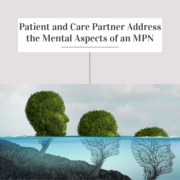This is the second part of a three-part series which deals with common concerns on returning to work after a cancer diagnosis.
In Part 1 of this series, I shared some tips with you on how to prepare for your re-entry into the workplace. In this article we will look at practical ways to handle issues such as fatigue and concentration, managing your workload, and dealing with stress.
Let’s start with some tips on coping with fatigue as it’s probably the biggest challenge you will face, regardless of whether you are working during treatment or returning to work after treatment has ended.
Coping With Cancer-Related Fatigue
Cancer-related fatigue (CRF) is increasingly recognized as one of the most common and distressing side effects of cancer and its treatments. It has been estimated that from one quarter to nearly all cancer patients experience CRF during and after treatment. Although things generally improves after therapy is completed, some level of fatigue may persist for months, or even years, following treatment.
Commenting on the impact of CRF on her own work, Kate Bowles, who was diagnosed with breast cancer in 2013, says, “The main advice I give is that chemo related fatigue is real and lasting. And also that your priorities change, often in very empowering ways. I am very calm in my job, because I really know now that it’s just a job.”
A lot of cancer patients don’t report fatigue to their doctors because they think that nothing can be done for it. In fact, there are things that can be done to alleviate the debilitating effects of CRF. If left untreated, fatigue may lead to depression and profoundly diminish your quality of life, so it’s important that you speak to your doctor if fatigue is an issue for you. Before you can address CRF specifically, your doctor needs to determine if there are any underlying medical issues which may be contributing to your fatigue.
Making some adjustments to your everyday routines can also help you cope with CRF.
Here are three ways to do this.
1. Make deposits in your ‘energy bank’
You may find it helpful to think of your energy reserves as your ‘energy bank’. Whenever you do an activity you make a withdrawal. And when you rest you make a deposit. It’s important to balance withdrawals with deposits. If you keep doing too much whenever you feel like you have energy, you’ll run out completely and not have any reserves left for the things that are important.
2. Plan your day
Planning is key when you have fatigue. Write a ‘To Do’ list each evening so you can prioritize the things you need to do at work the next day.
3. Do some regular light exercise
Try to get out in the fresh air for a walk at lunchtime. Although exercising may be the last thing you feel like doing when you’re tired, if you don’t exercise, you’re more likely to experience fatigue.
I also recommend you download a free app called Untire, which contains a program that will help you track and improve your energy levels. The app uses theories and techniques from scientifically proven cognitive behavior therapy, mindfulness-based cognitive therapy, positive psychology and physical exercise interventions.
Time Management
Managing your time at work is all about learning to work smarter, not harder. It’s not about packing more tasks into your day, but about streamlining how you go about your work and prioritizing key tasks.
Here are seven tips to develop better time management skills.
1. Track your time and eliminate the non-essential
First things first. If you’re going to manage your time better, you need to figure out where you spend your time. Use a tool like RescueTime to track your activities for a week. This will help you determine how much you can realistically accomplish in a day, identify the time of day when you are most productive, and uncover daily timesucks, such as reading emails (unsubscribe from those e-mail lists you no longer need). When we can clearly identify our daily time sinks and remove them, we become more focused and productive.
2. Do the most important thing first
Mark Twain once said, “If it’s your job to eat a frog, it’s best to do it first thing in the morning. And if it’s your job to eat two frogs, it’s best to eat the biggest one first.” The point that Twain was making is that you should take care of your biggest and most-challenging tasks first thing in the morning.
Each day, identify the one or two tasks that are the most important to complete, and get started right away on them. If a task is too big to complete in one day, divide it into smaller tasks to be spread out over several days. When you have accomplished a task, mark it off your list with a pen. This provides a psychological boost as it gives you visual confirmation that you are getting somewhere.
3. Batch related tasks
Batching refers to the process of using blocks of time for specific repetitive tasks. Different tasks demand different types of thinking, so save yourself time and mental energy by focusing on one type of task before moving on to the next.
4. Focus on one task at a time
Finding it hard to concentrate is a common effect of having had cancer. To combat this, focus on one task at a time instead of multi-tasking. Research tells us it can take up to 30 minutes to return your attention to whatever you were doing before an interruption. Put your phone away, close your email applications and any unnecessary browser windows on your computer. Concentrate fully on the one task you need to complete.
5. Take regular breaks
Allow yourself down-time between tasks. Break for lunch and take additional short breaks throughout the day. Maintain your energy reserves with nutritious snack breaks. Pack nuts, fresh fruits and veggies, hummus, or low-fat cheese to take to work with you.
6. Set time limits for tasks
Give yourself a certain time by which you will complete a task. For instance, reading and answering email can consume your whole day if you let it. Instead, set a limit of one hour a day for this task and stick to it. The easiest way to do this is to assign a solid block of time to this task rather than answering email on demand.
7. Let go of perfectionism
Stop trying to be perfect. When you’re a perfectionist, nothing will ever be good enough. That means you’ll stick with a task long past the deadline. You’ll say yes to too many things and take on too much in an effort to prove to yourself, and others, that nothing has changed since your cancer diagnosis.
Sometimes you need to realize that good enough is sufficient and when you reach that point, then simply stop. This is not an excuse to do a poor job, but it is intended to give you permission to do a good job and then leave it there. Don’t waste precious energy and time polishing and perfecting something past that point.
Managing Stress
It’s normal to feel some stress on returning to work, so it makes sense to plan ahead for how to deal with stressful situations. Here are some tips to help you.
1. Identify your body’s stress response
How we experience stress is individual to each of us. Learning to tune into what happens in your body when you perceive a stressful situation is the first step in understanding your own individual stress response. Does your jaw clench? Is your breath shallow? Are your muscles tense? When you become more aware of your physical response to stress, it will help regulate the tension when it does occur.
2. Slow down and pay attention to your breathing
When stress hits, everything speeds up. Our thoughts race, our heart pounds and our breathing increases. This can make it difficult to think rationally. Consciously slow down your breathing. When we are stressed we tend to breathe more shallowly. When you feel stressed, practice taking some slow deep abdominal breaths. Deep abdominal breathing slows the heart down, lowers blood pressure and helps us feel calmer.
3. Come back to your senses
One of the best ways to stop getting lost in your thoughts is to come to your senses and ground yourself in the present moment. A simple exercise is to notice five things around you. Practice this periodically throughout the day, especially at those times you find yourself getting caught up in your thoughts and feelings.
- Look around and notice five things that you can see;
- Listen carefully and notice five things that you can hear;
- Notice five things that you can feel in contact with your body (for example, your feet upon the floor, your back against the chair);
- Finally, do all of the above simultaneously.
4. Take Some Exercise
Physical activity is one of the simplest and most effective ways to reduce stress and anxiety – providing a natural outlet for your body when you are exposed to too much adrenaline.
Research has shown that there are many benefits to exercise. Not only does it help reduce the symptoms of fatigue, exercise encourages your body to release endorphins – often called ‘feel good hormones’. When released, endorphins can lift your mood and sense of well-being.
Go for a walk, head to the gym or find a lunch-time yoga class. Throughout the day take short breaks to stretch or do simple exercises at your desk.
Wrapping Up
Handling your re-entry to the workplace after a cancer diagnosis is all about organizing your time better, prioritizing your workload, establishing boundaries and becoming more comfortable with saying no to unreasonable demands.
Above all, it’s about making your health your top priority. Get adequate sleep, eat healthily, take some exercise and incorporate stress-management techniques into your daily routines.
I know from personal experience it isn’t always quite as straightforward as I have laid things out here. There will be many ups and downs. Deborah Bowman, a Professor of Medical Ethics, who was diagnosed with cancer in 2017, urges self-kindness and patience. “Don’t be afraid to say if it becomes unexpectedly (or expectedly!) difficult,” she says, “be kind to yourself and allow others to be kind to you too. Accept it may be up and down rather than a straightforward trajectory. Celebrate your good moments and forgive yourself the harder moments.”
Next month in Part 3 of this Returning To Work series, we will take a look at the opportunities and challenges of finding a new job after cancer. Until then, if you have any tips to share with readers about how you coped on returning to work, please share them in the comments below.
A Stanford Medicine X e-Patient scholar, Marie Ennis O’Connor is an internationally recognized keynote speaker, writer, and consultant on global trends in patient engagement, digital health and participatory medicine. Marie’s work is informed by her passion for embedding the patient voice at the heart of healthcare values. She writes about the experience of transitioning from breast cancer patient to advocate on her award-winning blog Journeying Beyond Breast Cancer.













